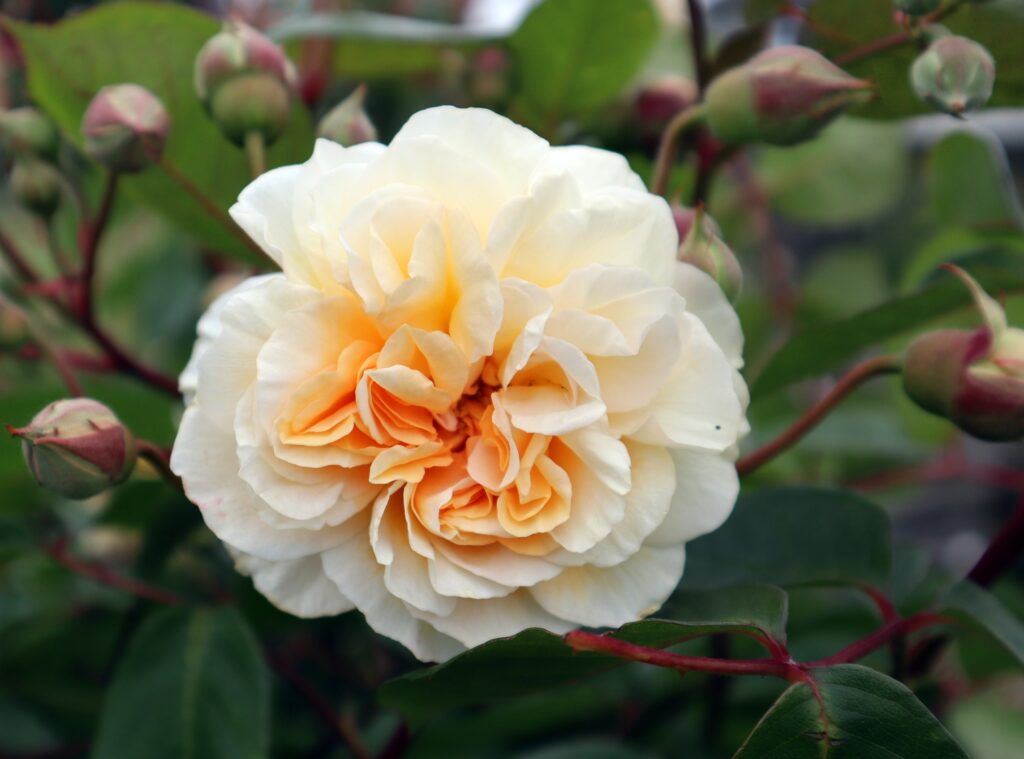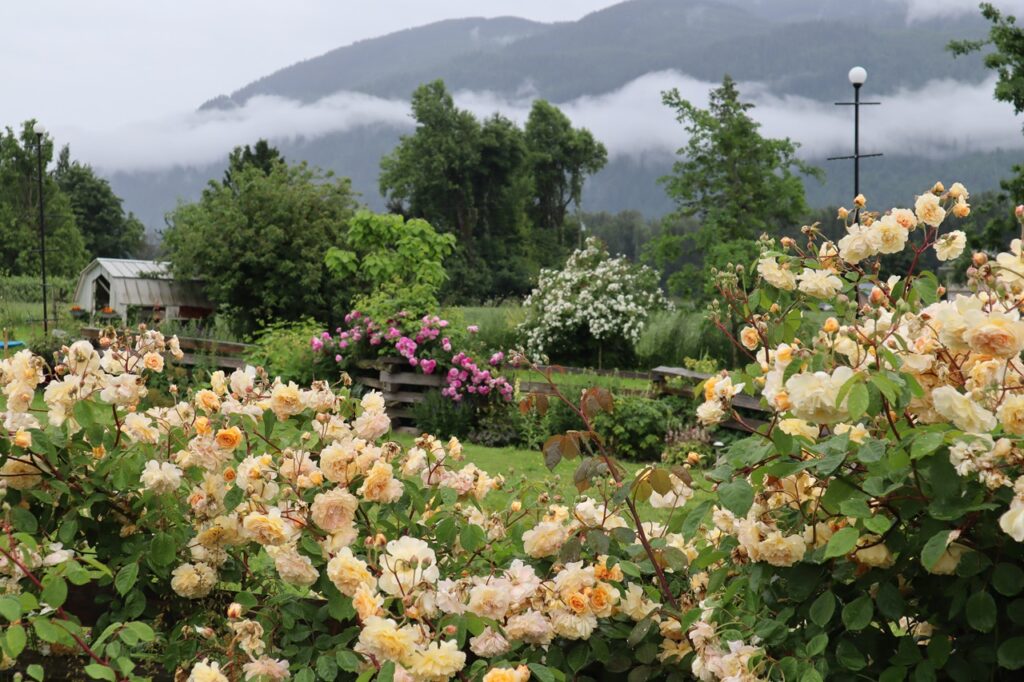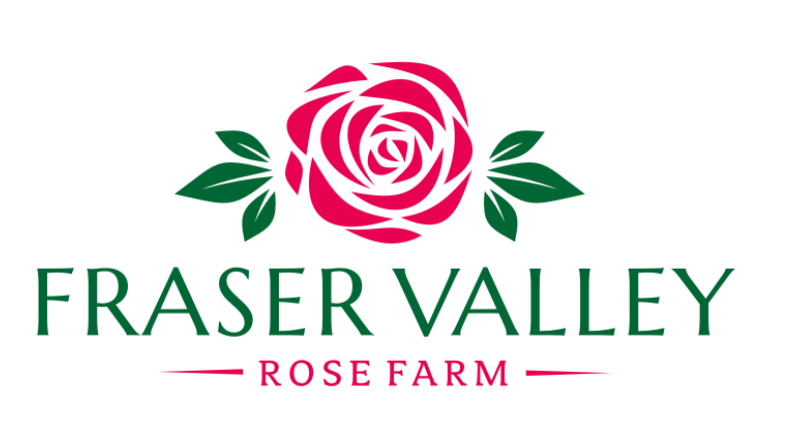(First published in the Roses-Canada Quarterly Journal)
The farmers’ market might seem a slightly off-key place to sell roses. There among the hand-crafted soaps and blackberry honey, the beaded jewellery and ancient grains bread, I know I seemed a little out of place. Don’t get me wrong. You’d sometimes find a vendor who offered a few herb or veggie starts aside their display of no-spray produce, at least for the first few weeks of the season. What wasn’t so common was vendors of ornamental plants – and especially not the “Queen of Flowers” herself, the garden rose.
However, the farmers’ market is just where I found myself in the fledgling years of our little rose nursery, Fraser Valley Rose Farm. We were trying to find customers for the old garden roses I had produced as cuttings from my own garden. Roses like ‘Sophie’s Perpetual’ or ‘Buff Beauty’ (pictured) that had once been easy enough to find in the mail-order business, but were now dropping out of the trade – in some cases along with the nurseries themselves.

Between my wife Lisa and I, I’m definitely the more avid gardener and grower. She was an excellent sport about spending our weekends trying to sell plants, and even though the roses were a tough sell at first, she indulged me with a fair amount of freedom in my growing choices. She gave me the occasional much-needed nudge towards diversifying our offerings, just to keep sales moving in the right direction.
So we grew an assortment of perennials from seed, and those ended up providing an easier way to connect with customers. The farmers’ market crowd was largely kind and attentive, politely reading the picture cards of these perennials. They were particularly keen on those with ecological value: drought tolerance, pollinator friendly and host plants for beneficial insects. It wasn’t difficult to place a small monarda (bee balm) or asclepias (milkweed) into their shopping baskets, but as soon as I started talking about roses, there was a discernible resistance.
This immediate, visceral reaction was something I wanted to understand. I had imagined our future farm business to be centred on roses, but these customers seemed unreceptive. Was it the price? No. I was selling my smaller 1 gallon pots for $15 dollars at the time. A bargain, really. And these customers didn’t hesitate to spend that much on a grilled-cheese sandwich from the food truck parked in the next stall. So what was it?
Fear. That’s eventually how I came to recognize it. It was a quick flash of fear that translated to a verbal brush-off. “I don’t have the space right now”. “We’re about to go on vacation”. “I only grow vegetables”. “I have a brown thumb”. It was this last one that came up most frequently, and it was the closest to the real underlying message: roses scare the heck out of me because I’ve heard they’re difficult to grow, and if I’m being honest, I don’t like the idea of being judged for doing it wrong.
It’s not like that grilled cheese sandwich, that would be finished in minutes. It’s not like a lavender-scented bath bomb that would go down the drain with the wash water. It’s not even like buying a hanging basket, displaying it for a few months before dumping it out into the compost. Growing a rose sounds like a commitment, and there’s a fair hesitation to take on a commitment when you’re not sure you can measure up.
And this is the crux of it. As Bill DeVor said in a presentation to the American Rose Society: “The rose industry spent the last hundred years teaching their customers to be absolutely terrified of the products they were producing”. He’s exactly right, but he could have gone even a bit further: much of the modern cultural baggage around roses goes right back to Victorian gardens, with their stern geometric beds dedicated exclusively to roses. This style of rose gardening, with roses segregated and trimmed up with bare lower stems for exhibition was exported without much change as the ideal for suburban rose gardens. To Bill DeVor’s point, the industry piled on with guidelines around specialized fertilizer regimens, pests and disease control. It’s no wonder novice gardeners might feel “judged”.
Lisa and I persisted and adapted our business in the early years. I planned and grew more of the kinds of plants that the farmers market crowd appreciated, and even began to grow veggies and cut flowers for market day. But I wasn’t quite ready to give up on roses.
And this is where I say something I hope will surprise you just a little: social media saved our rose farm.
Instead of selling the merits of roses one reluctant customer at a time, I decided to share my enthusiasm in a more receptive environment. Instagram is all about pictures, and roses are oh so photogenic. When I coupled a striking photo with a well-written description or story, I could side-step their natural defences. There’s nothing too threatening about an Instagram photo! Likewise, I could make an informative video for YouTube, and reach new gardeners right when they needed me: on call for when they Googled a question about that overgrown rose in their new property. If I could make that experience a little less intimidating for them, maybe there was hope to rehabilitate the reputation of roses yet!
I took some inspiration, I have no hesitation to admit, from Paul Zimmerman. In his book “Everyday Roses” and elsewhere in his public presentation, he made a mission of demystifying roses. This approach was exactly what the public need to hear: roses aren’t some difficult, fussy prima donna, demanding a special place in the garden and a detailed schedule of expensive sprays and amendments. Roses are tough, high-performance shrubs that deserve a spot in the garden with all of your other useful plants: for bees, for wildlife habitat, sometimes for hips, and of course for the way their flowers complement other plants.
Of course, it took some time for the benefits of this outreach to make any difference to our business. Lisa and I held onto our day jobs, and continued to pack our plants out to community selling events on the weekends. But now the momentum was shifting. Local customers who had met me on YouTube or Instagram or Facebook seemed a little less intimidated by the roses. Viewers within driving distance began to ask if they could visit the farm, and while this was unexpected, it wasn’t unwelcome.
In the past couple of years, Lisa and I have started to add the garden beds and landscape features that were always in our imagination, but that we’d never had the time or imperative to get into the ground. I have to say, the misty Fraser Valley mountains of Nicomen Island make for an excellent bit of borrowed landscape to our mixed plantings of roses and perennials. I’m enjoying a return of sorts to the very thing that started us on this path: a passion for gardening that eventually gravitated to roses.

The YouTube channel that I started in our difficult yearly years (and a bit reluctantly, I have to admit, because who likes public speaking?) has yielded what I feel are some rare advantages for a small farm: a chance to speak directly to potential customers, and even a modest supplemental income to let me grow roses full time. Anyone who has farmed for a living will understand that our challenges are far from over. Quitting the day job wasn’t the first step, but the feeling in the pit of my stomach tells me that it’s a pretty significant one.
In recognition that I’m writing this article for and audience of dedicated rose lovers in Canada, I’d like to conclude with a few final thoughts. The first is gratitude: the rose societies and the rose community at large in Canada has been incredibly helpful and supportive. I feel I owe particular thanks to my local rose societies, the Fraser Pacific Rose Society and the Vancouver Rose Society, both of which welcomed me to speak and sell plants at a time when the rest of the market was less than enthusiastic, and I really needed the encouragement.
Next, I don’t mind emphasizing what a powerful tool social media can be for the future of our hobby. Particularly in the last couple of years, as local garden clubs have foregone many of their in-person gatherings due to the pandemic, I feel the advantages of online community building becomes clear. As one example, I started a small Facebook group called the “Canada Rose Exchange” in this same time period, and it has recently passed the mark of 1000 members. These are Canadians from all age groups and regions, and they’ve come together to share pictures, offer opinions, and even to trade roses and cuttings of hard-to-find varieties.
Finally, Lisa and I are humbled by the support, and we want to take this opportunity to build a special little rose nursery and garden on beautiful Nicomen Island. These days it’s very much a work in progress, but we’re excited to share that progress with the community that has made it possible. Whether you’re able to visit in person during the selling season or equally if you can only visit through our videos, I hope you take this as a very warm invitation to Fraser Valley Rose Farm.
